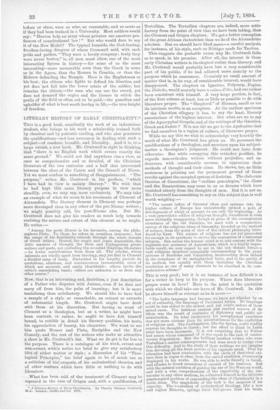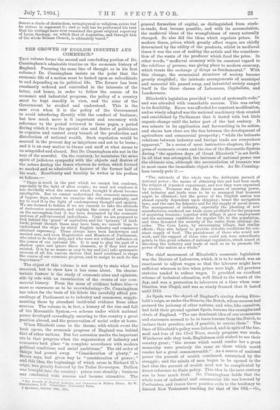LITERARY HISTORY OF EARLY CHRISTIANITY.* THIS is a good book,
manifestly the work of an industrious student, who brings to his work a scholarship trained both by classical and by patristic reading, and who also possesses the qualifications—not less necessary in dealing with such a subject—of candour, breadth, and liberality. And it is, to a large extent, a new book. Mr. Cruttwell is right in thinking that "there is no English work which covers exactly the same ground." We could not find anywhere else a view, at once so comprehensive and so detailed, of the Christian literature of the two centuries and a half that intervened between the close of the Canon and the Council of Nicina,.
Yet we must confess to something of disappointment. " The purpose," writes Mr•. Cruttwell in his preface, " which I have had in view is mainly literary." We wish that he had kept this same literary purpose in view more steadily, even, we may say, more exclusively. We may take an example of what we mean in his treatment of Clement of Alexandria. The literary element in Clement was perhaps more developed than in any other of the pre-Nicene writers ; we might possibly add, the post-Nicene also. But Mr. Cruttwell does not give his readers as much help towards realising the nature and extent of this element as he might. He writes :— " Among the poets Homer is his favourite, among the philo- sophers Plato. To these he refers in countless instances ; but the range of his familiarity extends through the whole domain of Greek letters. Hesiod, the tragic and comic dramatists, the Attic masters of thought, the Stoic and Pythagorean prose- writers and poets, not excluding the so-called Sibylline literature —he levies contributions from them all. The scholar, whose interests are wholly apart from theology, may yet find in Clement a fruitful mine of study. Embedded in his lengthy periods lie quotations, allusions, and reminiscences innumerable, some of which are accurate and easily identifiable ; others invite the critic's emendating hand ; others are unknown to us from any other source."
Now, that is an interesting and, doubtless, a just description of a Father who disputes with Jerome, even if he does not carry off from him, the palm of learning; but it is more tantalising than satisfactory. We should like to have had a sample of a style so remarkable, an extract or extracts of substantial length. Mr. Cruttwell might have dealt with them at his discretion. Not having to treat of Clement as a theologian, but as a writer, he might have been content, or rather, he ought to have felt himself bound, to exhibit in detail his literary qualities, his taste, his appreciation of beauty, his eloquence. We want to see him quote Homer and Plato, Euripides and the New Comedy, and the rest of the writers who make so attractive a show in Mr. Cruttwell's list. What we do get is far less to the purpose. There is a catalogue of his work, extant and non-extant, with;a notice too brief to give any satisfactory idea of either matter• or style ; a discussion of his "Theo- logical Principles," too brief again to be of much use as a criticism of his exegesis, of his ecclesiastical theories, and of other matters which have little or nothing to do with literature.
What has been said of the treatment of Clement may be repeated in the case of Origen and, with a qualification, of * A Literary History of Eariy Christianity. By Charles Thomas Cruttwell, M.A. London, Griffin and Co. HR. Tertullian. The Tertullian chapters are, indeed, more satis- factory from the point of view that we have been taking, than the Clement and Origen chapters. We get a better conception of the great African rhetorician than we do of the Alexandrine scholars. But we should have liked more—a careful analysis, for• instance, of his style, such as Bottiger made for Tacitus.
This suggests the probable cause why Mr•. Cruttwell fails, so to speak, in his promise. After all, the interest in these early Christian writers is theological rather than literary, and Mr. Cruttwell would probably have lost a very considerable part of his public, if he had adhered more strictly to the purpose which he announces. Certainly no small amount of matter that is, in its way, of considerable interest, would have disappeared. The chapters on Ignatius, Polycar•p, Papias, the Didacho, would scarcely have a raison cr aro, had our author been consistent with himself. A very large portion, in fact, of the first volume at least, has as little as possible to do with literature proper. The " Shepherd " of Hermas, small as are its intrinsic merits, is an exception. As the earliest specimen, of the Christian allegory it has, to say the least, literary associations of the highest interest. But what are we to say of the Apocryphal Gospels, and of the writings of the Gnostics, Greek and Judaic P It is not till we get to the Apologists that we find ourselves in a region of culture, of literature proper.
While we say this we wish to acknowledge very heartily the merit of what Mr. Cruttwell has given us. He possesses the qualifications of a theologian, and exercises upon his subject matter a theologian's judgment. He could not have done otherwise. But while occupying this orthodox position, he regards non-orthodox writers without prejudice, and en- deavours, with considerable success, to appreciate their methods of thought and their aims. He shows, too, no little acuteness in pointing out the permanent ground of these revolts against the accepted system of doctrine. The elaborate theories of Gnosticism, the " endless genealogies," the moons and the Emanations, may seem to us as dreams which have vanished utterly from the thoughts of men. But it is not so. Mr. Cruttwell has something to say on this subject that is well worth weighing :— "The recent influx of Oriental ideas and systems into the higher culture of Europe has undoubtedly opened a path of development of which at present we see only the beginning. As a vast syncretistic edifice of religious thought, Gnosticism is even more distinctly reappearing, though in place of the cosmogonical structures of the old Gnostics, we meet with a comparative survey of the religious ideas of humanity, founded on the method of science, from the point of view of the critical philosophy intro- duced by Kant. The science of religions has not yet proceeded far enough in its synthesis to evolve the conception of a universal religion. But unless the human mind is to rest content with the dogmatic non possianus of Agnosticism, which is a highly impro- bable result, we may expect to see in the not distant future a vast religious structure essentially corresponding to the great systems of Basilides and Valentinus, transcending them indeed in the soundness of its metaphysical basis, and in the purity of its method, but equally with them including the Christian revelation as one of many elements to be absorbed in its com- prehensive scheme."
This is very good; but it is an instance of how difficult it is for a writer to keep to his purpose. Where does literature proper come in here P More to the point is the quotation with which we shall take our leave of Mr. Cruttwell. In this he shows himself as relevant as he is acute :— " The Latin language had become, we know not whether by an act of authority, the language of Provincial Africa. No language could be less suited to the ardent and yet subtle nature of these mixed races. The habitual caution and studied reserve of its idiom was the result of centuries of diplomacy and public ad- ministration. Its total inadequacy for metaphysical exactness was not more obvious than its unsuitableness for the exaltation of religious zeal. The Carthaginian, like the Syrian, could readily express his thoughts in Greek ; but the effort to think in Latin must have been enormous. It is not surprising that no Father had arisen whose command of it was equal to the task of contro- versial disputation. But the brilliant heathen writers who were Tertullian's earlier contemporaries had done much to bridge over this difficulty. And to the study of their writings we can imagine him devoting all the fresh powers of his vigorous mind. That his education had been coextensive with the circle of rhetorical cul- ture then in vogue is clear, from the varied erudition abundantly displayed in his works. He was able to write fluently in Greek, and alludes to Greek recensions of several of his treatises. But with the natural ambition of gaining the ear of the Western world, and with a wise comprehension of the superiority of the ver- nacular to any other medium, he addressed himself to the hitherto unattempted problem of expounding the ideas of Christianity in a Latin dress. The magnitude of the task is the measure of his capacity. The vocabulary of ecclesiastical theology, like a new and higher Minerva, springs forth full-grown from his brain. Scarce a shade of distinction, metaphysical or religious, exists but he strives to represent it ; and so well has he performed his task that his writings have ever remained the great original repertory of Latin theology, on which that of Augustine, and through him of the whole Roman Church, is ultimately based."











































 Previous page
Previous page